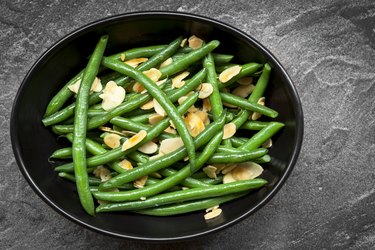
Eating green beans for weight loss can be very effective — as long as you aren't eating only green beans. Instead, use them as one component of a balanced, reduced-calorie diet that is rich in the nutrients your body needs to stay healthy.
Enjoying a Green Bean Diet
Video of the Day
First, the benefits of eating green beans: According to the USDA, a 1-cup serving of raw green beans contains only 31 calories. The same serving has 1.83 grams protein, a scant 0.22 grams fat and 6.97 grams carbohydrate, plus an impressive 2.7 grams fiber and 3.26 grams sugar.
Video of the Day
One cup of raw green beans also contains 37 milligrams calcium, 25 milligrams magnesium, 38 milligrams phosphorus and a whopping 211 milligrams potassium, plus smaller amounts of many other nutrients.
You can eat those beans by the handful as an easy on-the-go snack, or pair them with your favorite dip. The beans' natural crunch and the smooth dip make a pleasant contrast in textures. Just pay attention to how much dip you're using, because dips and nut butters tend to be very calorie-dense, and it's easy to lose track of how much you've eaten.
Tip
Prepare single-serve portion sizes of your favorite dip ahead of time, so you know exactly how much you'll consume.
You can also use cooked green beans as a side dish. As explained at Canada's Half Your Plate, at each meal you should fill half your plate with fruits and vegetables — and you can use fiber- and nutrient-rich foods like green beans to "stretch" smaller quantities of calorie-rich side dishes, cutting down on your calorie intake while still leaving you satisfied.
The nutrient makeup of green beans changes a little bit when they're cooked. According to the USDA, 1 cup of cooked green beans from a can contains 33.7 calories, 1.71 grams protein, 0.7 grams fat and 6.59 grams carbohydrate, along with 2.91 grams fiber and just 1.19 grams of sugar. That serving also has 58.1 milligrams calcium, 19.9 milligrams magnesium, 30.6 milligrams phosphorus and 147 milligrams potassium.
Watch out for added sodium from canned beans. The aforementioned 1-cup serving has a whopping 505 milligrams of sodium.
Read more: Make Ahead Green Bean Casserole
Eat These Too
While you can eat green beans for weight loss, you shouldn't eat only green beans. Not only will you get tired of them eventually, but you'll also be missing out on the many essential nutrients you get from other foods. To keep your body healthy, you must eat a well-balanced diet from all the food groups.
The Department of Health and Human Services provides some recommendations to help you achieve that balanced diet. They include:
Eat a variety of fruits and vegetables from every subgroup.
Choose high-quality protein sources such as fish, lean meats and poultry, nuts, eggs and soy.
Aim to consume at least half your grains in the form of whole grains.
Choose fat-free or low-fat dairy foods.
Limit added sugar and saturated fat to less than 10 percent of your daily calorie intake, and sodium to less than 2,300 milligrams
per day.
When you use oils, opt for healthy oils that are rich in unsaturated fat.
Read more: Beans and Digestive Problems
What About Weight Loss?
If you're tackling a green bean diet to lose weight, there's one other factor you must consider, which is achieving a calorie deficit. But don't take that calorie deficit to an extreme. Crash diets that promise speedy results almost always backfire, as the weight comes back on with a vengeance once you return to your normal habits.
Instead, aim for a deficit of 500 to 1,000 calories per day to achieve a weight loss of 1 to 2 pounds per week, which the Centers for Disease Control and Prevention and numerous other health authorities define as a healthy rate of weight loss.
There's one more piece of the puzzle that can help you meet your goals: exercise. According to the National Weight Control Registry, the vast majority of people who successfully lose weight and keep it off do so with a combination of dietary changes and increased physical activity. Even mild to moderate physical activity, like going for a daily walk, swim or bike ride, can be very effective for weight loss.
- USDA: "Beans, String, Green, Raw"
- Half Your Plate: "Fill Half Your Plate With Fruits and Veggies"
- USDA: "Beans, String, Green, Cooked, From Canned, Fat Not Added in Cooking"
- Department of Health and Human Services: "Key Elements of Healthy Eating Patterns"
- National Weight Control Registry: "NWRC Facts"
- Centers for Disease Control and Prevention: "Losing Weight"